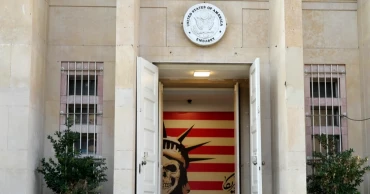America
Bangladeshi American data scientist Dr. Rumman Chowdhury among US Science Envoys for 2024
The US Department of State has selected four distinguished scientists to serve as Science Envoys for 2024.
They are Dr. Rumman Chowdhury, Dr. Stephanie “Steffi” Diem, Dr. Sian Proctor, and Dr. Dawn Wright.
Through the US Science Envoy Program, eminent American scientists and engineers leverage their expertise and networks to forge connections and identify opportunities for sustained international cooperation to advance solutions to shared challenges, champion innovation, and demonstrate America’s scientific leadership and technical ingenuity.
The scientists selected to participate in 2024 make up the first all-female cohort in the history of the US Science Envoy Program, said the US Department of State.
The US Science Envoy program was established by the Secretary of State in 2010.
Read: Irish Minister Simon Coveney pays homage to Father of the Nation at Dhanmondi-32
Like their 30 predecessors, the 2024 Cohort will travel as private US citizens to engage internationally with civil society as well as government interlocutors.
Science Envoys help inform the Department of State, other US government agencies, and the scientific community about opportunities for science and technology cooperation.
The State Department selected the 2024 cohort to take advantage of their expertise in key issues facing the world today: Artificial Intelligence, Fusion Energy, Civil Use of Space, and Ocean Sustainability.
Dr. Rumman Chowdhury is a data scientist and social scientist. She is the CEO of Humane Intelligence, a technology nonprofit that builds a community of practice around evaluations of artificial intelligence (AI) models.
Dr. Chowdhury is also a Responsible AI Fellow at Harvard University’s Berkman Klein Center for Internet and Society.
Previously, Dr. Chowdhury served as Director of the Machine Learning Ethics, Transparency, and Accountability team at Twitter, as well as the Global Lead for Responsible AI at Accenture Applied Intelligence.
Read: UN envoy: Finding that some hostages were victims of sexual violence doesn’t justify Israeli attacks
She has earned numerous awards and accolades, including Time Magazine’s 100 most Influential People in AI, BBC’s 100 Women, Worthy Magazine’s top 100, the Bay Area’s top 40 under 40, and Forbes’ labeled her one of Five Who are Shaping AI.
Dr. Chowdhury holds two undergraduate degrees from MIT, a M.S. in Quantitative Methods of the Social Sciences from Columbia University, and a Ph.D. in political science from the University of California, San Diego.
1 year ago
Biden warns US democracy in peril from 'extremist' Trump
President Joe Biden issued one of his most dire warnings yet that Donald Trump and his allies are a menace to American democracy, declaring Thursday that the former president is more interested in personal power than upholding the nation's core values and suggesting even mainstream Republicans are complicit.
"The silence is deafening," he said.
During a speech in Arizona celebrating a library to be built honoring his friend and fierce Trump critic, the late Republican Sen. John McCain, Biden repeated one of his key campaign themes, branding the "Make America Great Again" movement as an existential threat to the U.S. political system. He's reviving that idea ahead of next year's presidential race after it buoyed Democrats during last fall's midterm election, laying out the threat in especially stark terms: "There's something dangerous happening in America right now."
"We should all remember, democracies don't have to die at the end of a rifle," Biden said. "They can die when people are silent, when they fail to stand up or condemn threats to democracy, when people are willing to give away that which is most precious to them because they feel frustrated, disillusioned, tired, alienated."
The 2024 election is still more than a year away, yet Biden's focus reflects Trump's status as the undisputed frontrunner for his party's nomination despite facing four indictments, two of them related to his attempts to overturn Biden's 2020 victory.
Trump campaign reports raising more than $7 million after Georgia booking
The president's speech was his fourth in a series of addresses on what he sees as challenges to democracy, a topic that is a touchstone for him as he tries to remain in office in the face of low approval ratings and widespread concern from voters about his age, 80.
He used this line of political attack frequently ahead of last year's midterms, when Democrats gained a Senate seat and only narrowly lost the House to the GOP. But shifting the narrative in Washington could be especially tricky given that Biden is facing mounting pressure on Capitol Hill, where House Republicans held the first hearing in their impeachment inquiry and where the prospect of a government shutdown looms — a prospect Trump has actively egged on.
On the first anniversary of Jan. 6, 2021, when a mob of Trump supporters staged an insurrection, Biden visited the Capitol and accused Trump of continuing to hold a "dagger" at democracy's throat. He closed out the summer that year in the shadow of Philadelphia's Independence Hall, decrying Trumpism as a menace to democratic institutions.
And in November, as voters were casting midterm ballots, Biden again sounded a clarion call to protect democratic institutions.
Advisers see the president's continued focus on democracy as both good policy and good politics. Campaign officials have pored over the election results from last November, when candidates who denied the 2020 election results did not fare well in competitive races, and point to polling that showed democracy was a highly motivating issue for voters in 2022.
"Our task, our sacred task of our time, is to make sure that they change not for the worst but for the better, that democracy survives and thrives, not be smashed by a movement more interested in power than a principle," Biden said Thursday. "It's up to us, the American people."
Like previous speeches the latest location was chosen for effect. It was near Arizona State University, which houses the McCain Institute, named after the late senator, the 2008 Republican presidential nominee who spent his public life denouncing autocrats around the globe.
Biden said that "there is no question that today's Republican Party is driven and intimidated by MAGA extremists." He pointed to Trump's recent suggestion that Gen. Mark Milley, the chairman of the Joint Chiefs of Staff who is stepping down from his post on Friday, should be executed for allegedly treasonous betrayal of him.
House Republicans make their case for Biden impeachment inquiry at first hearing
"Although I don't believe even a majority of Republicans think that, the silence is deafening," Biden added. He also noted that Trump has previously questioned those who serve in the U.S. military calling "service members suckers and losers. Was John a sucker?" Biden asked, referring to McCain, who survived long imprisonment in Vietnam.
Then he got even more personal adding, "Was my son, Beau — who lived next to a burn pit for a year and came home and died — was he a sucker for volunteering to serve his country?"
The late senator's wife, Cindy McCain, said the library, which is still to be built, grew out of bipartisan support from Biden, Democratic Gov. Katie Hobbs and her predecessor, Republican Gov. Doug Ducey. She called it "a fitting legacy for my husband" and recalled how the Bidens introduced her to her future husband decades ago.
"I am so grateful for that," Cindy McCain said, her voice cracking.
Later Thursday, the Treasury Department announced $83 million in federal funds to help construct the 83,000-square-foot library near Papago Park.
Republicans competing with Trump for their party's 2024 presidential nomination have largely avoided challenging his election falsehoods, and Biden said Thursday that voters can't let them get away with it.
"Democracy is not a partisan issue," he said. "It's An American issue."
After the speech, Biden spoke at an Arizona fundraiser for his reelection campaign. The attendees included Brittney Griner, the basketball star who was arrested last year at the airport in Moscow on drug-related charges and detained for nearly 10 months.
Biden tells Pacific islands leaders that he hears their warnings about climate change and will act
A number of candidates who backed Trump's election lies and were running for statewide offices with some influence over elections — governor, secretary of state, attorney general — lost their midterm races in every presidential battleground state.
Still, in few states does Biden's message of democracy resonate more than in Arizona, which became politically competitive during Trump's presidency after seven decades of Republican dominance. Biden's victory made the state a hotbed of efforts to overturn or cast doubt on the results, and some GOP candidates continue to deny basic facts on elections.
That's help reinforce other claims from Democrats about GOP extremism on other, separate issues, said Republican officials who spoke on condition of anonymity to candidly describe the party's election shortcomings last year. Though Trump-animated forces in the party dominate public attention, many Republican voters were concerned about other issues such as the economy and the border and did not want to focus on an election result that was two years old.
Republican state lawmakers used their subpoena power to obtain all the 2020 ballots and vote-counting machines from Maricopa County, then hired Trump supporters to conduct an unprecedented partisan review of the election. The widely mocked spectacleconfirmed Biden's victory but fueled unfounded conspiracy theories about the election and spurred an exodus of election workers.
In the midterms, voters up and down the ballot rejected Republican candidates who repeatedly denied the results of the 2020 election. But Kari Lake, the GOP gubernatorial candidate, has never conceded her loss to Hobbs and plans to launch a bid for the U.S. Senate. Last year, Republican Senate candidate Blake Masters and Mark Finchem, who ran for secretary of state, also repeated fraudulent election claims in their campaigns.
Sen. Mark Kelly, D-Ariz., who defeated Masters, said the importance of defending democracy resonates not only with members of his own party but independents and moderate GOP voters.
"I met so many Republicans that were sick and tired of the lies about an election that was two years old," Kelly said.
Arizona Rep. Ruben Gallego, who is seeking the Democratic nomination in next year's Senate race, said a democracy-focused message is particularly important to two critical blocs of voters in the state: Latinos and veterans, both of whom Gallego said are uniquely affected by election denialism and the Jan. 6 Capitol insurrection.
"You know, we come from countries and experiences where democracy is very corrupt, and many of us are only one generation removed from that, but we're close enough to see how bad it can be," Gallego said. "And so Jan. 6 actually was particularly jarring, I think, to Latinos."
2 years ago
‘How many in Bangladesh police want to go to America?’ DMP Deputy Commissioner asks
Dhaka Metropolitan Police’s Deputy Commissioner (Media) Faruk Hossain has said the newly implemented US visa policy will not have any impact on police operations.
“We have more than 2 lakh personnel in Bangladesh Police. My question is: How many of them actually want to go to America? The number is very low. From that perspective, we believe this visa restriction will not have any impact on the police,” Faruk said while talking to reporters at DMP’s media centre in the capital.
Also read: Trade ties with US won't be disrupted by visa policy: Salman F Rahman
Deputy Commissioner Faruk said that police have not yet received any list of individuals targeted by the visa restriction.
“We believe the police force operates within the boundaries of law, adhering to human rights standards. We have done so in the past, and we will continue to do so in the future,” Faruk Hossain said. “Therefore, I have faith that this visa policy will not in any way hinder our operations.”
Also read: Visa restrictions: US didn’t issue any statement regarding anyone in particular, says Home Minister
When asked about US concerns regarding the role of law enforcement agencies during the upcoming election, the DMP deputy commissioner said police will continue to work within the framework of law.
“The role of the police during the upcoming election is to provide security at polling centers. The responsibility that will be placed on us comes from the Election Commission. We will fulfil that responsibility,” the DMP deputy commissioner said. “In this regard, we do not think that the US visa policy will pose any obstacle to our duties.”
Also read: 'Nothing to lose' from visa restrictions: Shahriar Alam
2 years ago
A CIA-backed 1953 coup in Iran haunts the country with people still trying to make sense of it
Seventy years after a CIA-orchestrated coup toppled Iran's prime minister, its legacy remains both contentious and complicated for the Islamic Republic as tensions stay high with the United States.
While highlighted as a symbol of Western imperialism by Iran's theocracy, the coup unseating Prime Minister Mohammad Mossadegh — over America's fears about a possible tilt toward the Soviet Union and the loss of Iranian crude oil — appeared backed at the time by the country's leading Shiite clergy.
But nowadays, hard-line Iranian state television airs repeated segments describing the coup as showing how America can't be trusted, while authorities bar the public from visiting Mossadegh's grave in a village outside of Tehran.
Such conflicts are common in Iran, where "Death to America" can still be heard at Friday prayers in Tehran while many on its streets say they'd welcome a better relationship with the U.S. But as memories of the coup further fade away along with those alive during it, controlling which allegory Iranians see in it has grown more important for both the country's government and its people.
Also read : Iran, Saudi Arabia and Egypt are among 6 nations set to join the BRICS economic bloc
"Maybe the U.S. did this out of fear of the emerging power of the Soviet Union, but it was like wishing for an earthquake to get rid of a bad neighbor," said Rana, a 24-year-old painter who like some others who spoke to The Associated Press gave only her first name for fear of reprisals. For Iranians, "the rancor has never melted."
The August 1953 coup stemmed from U.S. fears over the Soviet Union increasingly wanting a piece of Iran as Communists agitated within the country. The ground had been laid partially by the British, who wanted to wrest back access to the Iranian oil industry, which had been nationalized earlier by Mossadegh.
Though looking initially like it failed, the coup toppled Mossadegh and cemented the power of Shah Mohammad Reza Pahlavi. It also lit the fuse for the 1979 Islamic Revolution, which saw the fatally ill shah flee Iran and Ayatollah Ruhollah Khomeini usher in the theocracy that still governs the country.
Today, several who spoke to the AP about the coup and possible relations with the U.S. put it in the context of Iran's ailing economy, which has been battered by years of sanctions after the collapse of its 2015 nuclear deal with world powers.
Lower tensions with the U.S. "will bring more money for my business," said Hossein, 47, who runs a canteen for cab drivers in southern Tehran. "Now taxi drivers spend less compared to the past years and it is because of these bad relations, sanctions."
"I know about this bitter history but it should come to end sometime soon," added Majid Shamsi, who works as a parcel carrier in central Tehran. "Young people in Iran seek a better life and it cannot come as a result of enmity with" the U.S.
Even during increasingly common protests by teachers, farmers and others in Iran, some of the regular chants include: "Our enemy is here; they lied to us (that the enemy) is the U.S."
"Iran today should accept a deal with the U.S. like what it did to release dual nationals," added teacher Reza Seifi, 26. "I need it for my better future, for a better future for all."
Also read : Abu Dhabi Chess:GM Ziaur Rahman beat FM Ebrahimi Herab Hamidreza of Iran
But like with the exchanges with the U.S., there are limits to how far Iran's government will go in remembering Mossadegh.
Last weekend, State television's English-language Press TV aired a segment with a journalist standing on Mossadegh Street in northern Tehran. However, over the last 20 years, police have restricted access to those wanting to visit his grave in his ancestral home in the village of Ahmadabad, some 90 kilometers (55 miles) northwest of Tehran. In the village, tall walls and a locked gate keep those wanting to pay their respects out, while officers question those who look like they don't live there.
Some found other ways to mark the 70th anniversary of the coup.
"I could not go to his grave to pay tribute but I have visited the graves of his supporters and allies like Hossein Fatemi," said Ebrahim Nazeri, 32, as he, his wife and two children stood at the graveside of Fatemi, Mossadegh's foreign minister who was executed after the coup. "He was a hero like Mossadegh."
Another visitor to Fatemi's grave, teacher Ehsan Rahmani simply said that "the U.S. planted hatred in the hearts of Iranians" through the coup.
For Iran's Supreme Leader Ayatollah Ali Khamenei, the 1953 coup represents what he views as the continued threat from the U.S., whether that be from economic sanctions or the nationwide protests that have gripped Iran after the death last year of Mahsa Amini.
On Thursday, Khamenei told members of Iran's paramilitary Revolutionary Guard that Washington had planned to overthrow the country's theocracy through a coup like in 1953 through its military. Iran carried out mass executions and purges of its regular military after the revolution.
Also read : Iranian FM says ties with Saudi Arabia "moving in right direction"
"The enemies tried to undermine and paralyze the revolution by creating continuous crises," Khamenei said, according to a transcript on his official website. "They then plotted to put an end to the revolution with a measure similar to the coup that took place on August 19, (1953). However, the (Guard) thwarted it. This is the reason why the enemies have so much hatred and animosity towards the" Guard.
The Guard's chief, Gen. Hossein Salami, in reply, vowed to "expel" American forces from the region. His remarks came amid a major American military buildup in the Persian Gulf, with the possibility of U.S. troops boarding and guarding commercial ships in the Strait of Hormuz, through which 20% of all oil shipments pass.
However, some remain hopeful Iran could reach a détente with the U.S., as it recently did with Saudi Arabia.
"I dream that the supreme leader allows talks and better relations with the U.S.," said Mohsen, 29, a furniture shop salesman in northern Tehran. "He allowed the restoration of ties with Saudi Arabia. He can allow the same for the U.S."
2 years ago
America's war addiction
The US has been engaged in military interventions worldwide over the past decades.
America's heavy reliance on military approaches over the past decades has been driven by "a hankering to retain hegemony in the world" and "vested interests of the country's influential military-industrial complex," according to experts.
The US' "war addiction," which has led to hundreds of thousands of deaths and destruction of countless homes in an array of countries, has also backfired, with casualties and tragedies among its troops piling up amid sky-high military spending.
War addiction
"Violence is the primal problem of American history, the dark reverse of its coin of freedom and abundance," wrote US historian David Courtwright in 1996.
The root cause of America's addiction to the use of armed forces lies in its yearning to maintain hegemony.
Read: Taliban guard airport as most NATO troops leave Afghanistan
4 years ago
Was America's 20-year war in Afghanistan worth it?
As President Joe Biden ends the US combat role in Afghanistan this month, Americans and Afghans are questioning whether it was worth the time, cost and casualties.
More than 3,000 American and other NATO lives lost, tens of thousands of Afghans dead, trillions of dollars of US debt that generations of Americans will pay for, and an Afghanistan that in a stunning week of fighting appears at imminent threat of falling back under Taliban rule, just as Americans found it nearly 20 years ago.
For Biden and some of the American principals in the US and NATO war in Afghanistan, the answer to whether it was worth the cost often comes down to parsing.
Read: Biden orders 1,000 more troops to aid Afghanistan departure
There were the first years of the war when Americans broke up Osama bin Laden's al-Qaida in Afghanistan and routed the Taliban government that had hosted the terrorist network.
That succeeded.
The proof is clear, says Douglas Lute, White House czar for the war during the George W Bush and Barack Obama administrations, and a retired lieutenant general: Al-Qaida has not been able to mount a major attack on the West since 2005.
"We have decimated al-Qaida in that region, in Afghanistan and Pakistan," Lute says.
But after that came the grinding second phase of the war. The US fears of a Taliban rebound whenever Americans eventually pulled out meant that service members kept getting sent back in, racking up more close calls, injuries and dead comrades.
Lute and some others argue that what the second half of the war bought was time – a grace period for Afghanistan's government, security forces and civil society to try to build enough strength to survive on their own.
Quality of life in some ways did improve, modernising under the Western occupation, even as the millions of dollars the US poured into Afghanistan fed corruption. Infant mortality rates fell by half. In 2005, fewer than one in four Afghans had access to electricity. By 2019, nearly all did.
The second half of the war allowed Afghan women, in particular, opportunities entirely denied them under the Taliban, so that more than one in three teenage girls – their whole lives spent under the protection of Western forces – today can read and write.
Read:Taliban sweep across Afghanistan's south, take 4 more cities
But it is that longest, second phase of the war that looks on the verge of complete failure now.
The US war left the Taliban undefeated and failed to secure a political settlement. Taliban forces this past week have swept across two-thirds of the country and captured provincial capitals, on the path of victory before US combat forces even complete their pullout. On many fronts, the Taliban are rolling over Afghan security forces that US and NATO forces spent two decades working to build.
This swift advance sets up a last stand in Kabul, where most Afghans live. It threatens to clamp the country under the Taliban's strict interpretation of religious law, erasing much of the gains.
Richard Boucher, assistant secretary of state for Central Asia during much of the war's first decade, says the criticism was largely not of the conflict itself but because it went on so long. "It was the expansion of war aims, to try to create a government that was capable of stopping any future attacks."
America expended the most lives and dollars on the most inconclusive years of the war.
The strain of fighting two post-9/11 wars at once with an all-volunteer military meant that more than half of the 2.8 million American servicemen and women who deployed to Afghanistan or Iraq served two or more times, according to the Costs of War project at Brown University.
The repeated deployments contributed to disability rates in those veterans that are more than double that of Vietnam veterans, says Linda Bilmes, a senior lecturer in public policy at Harvard University.
Linda calculates the US will spend more than $2 trillion just caring for and supporting Afghanistan and Iraq veterans as they age, with costs peaking 30 years to 40 years from now.
Read: Taliban take much of provincial capital in south Afghanistan
That is on top of $1 trillion in Pentagon and State Department costs in Afghanistan since 2001. Because the US borrowed rather than raised taxes to pay for the Afghanistan and Iraq wars, interest payments are estimated to cost succeeding generations of Americans trillions of dollars more still.
Annual combat deaths peaked around the time of the war's midpoint, as Obama tried a final surge of forces to defeat the Taliban. In all, 2,448 American troops, 1,144 service members from NATO and other allied countries, more than 47,000 Afghan civilians and at least 66,000 Afghan military and police died, according to the Pentagon and the Costs of War project.
All the while, a succession of US commanders tried new strategies, acronyms and slogans in fighting a Taliban insurgency.
4 years ago
Americans largely back Biden's virus response
Joe Biden is enjoying an early presidential honeymoon, with 60% of Americans approving of his job performance thus far and even more backing his handling of the coronavirus pandemic, according to a new poll from The Associated Press-NORC Center for Public Affairs Research.
4 years ago
Trump says his term is ending, transition will be orderly
President Donald Trump for the first time acknowledged his defeat in the Nov. 3 election and announced there would be an “orderly transition on January 20th” after Congress concluded the electoral vote count early Thursday certifying President-elect Joe Biden’s victory.
5 years ago
A moment in America, unimaginable but perhaps inevitable
To see it unspool — to watch the jumbled images ricochet, live, across the world’s endless screens — was, as an American, a struggle to believe your eyes. But there it was, in the capital city of the United States in early January 2021: a real-time breaking and entering the likes of which the republic has never seen.
5 years ago
One week in an America riven by politics and the plague
On Nov. 1, as election week dawned, Dr. Juan Fitz lay dying in the same Lubbock, Texas, hospital where he had worked in the emergency room for nearly 20 years.
5 years ago




.jpg)


.jpg)







